 |
ALL ABOUT BOWLING SCORES |  |
 |
ALL ABOUT BOWLING SCORES |  |
For analyses of bowling games other than traditional ten-pin, see
World Bowling (current-frame scoring)
Candlepin & Duckpin Bowling
First, it seems evident that the total number of possible ten-pin bowling games is quite large. We have eleven possibilities for the first ball thrown in the first frame (gutter, 1, 2, ..., 9, strike), and the same possibilities occur for each of the other nine frames. So without even considering the second ball in each frame, at a minimum we have 1110 = 26 billion possibilities. In fact, the true number of games is much, much larger due to the effect of the second ball in each frame. It's easy to show that the total number of possible games using traditional scoring is
669 x 241 = 5,726,805,883,325,784,576 (about 6 billion billion, or 6 quintillion)
Score Number of possible games Probability
0 1 < 0.01%
1 20 < 0.01%
2 210 < 0.01%
3 1,540 < 0.01%
4 8,855 < 0.01%
5 42,504 < 0.01%
6 177,100 < 0.01%
7 657,800 < 0.01%
8 2,220,075 < 0.01%
9 6,906,900 < 0.01%
10 20,030,010 < 0.01%
...
77 172,542,309,343,731,946 3.01%
...
288 12 < 0.01%
289 11 < 0.01%
290 11 < 0.01%
291 1 < 0.01%
292 1 < 0.01%
293 1 < 0.01%
294 1 < 0.01%
295 1 < 0.01%
296 1 < 0.01%
297 1 < 0.01%
298 1 < 0.01%
299 1 < 0.01%
300 1 < 0.01%
The full table is shown below. For each score above
above 290, there is only one possible way to play the game. This distribution is
shown in the following diagram. It is not precisely symmetric about its
maximum point.
The most common score out of all the possibilities is 77. This is the mode of the score distribution. The mean of the distribution is about 79.7, so if you score above that, you can certainly argue that you're doing better than average!
The standard deviation of this score distribution is 13.7 pins.
If we show the cumulative probability histogram corresponding to the score distribution, we can determine the percentiles for various scores:

For example, if we bowl 98 or higher, we're already in the 90th percentile of all possible bowling scores. The median, or 50th percentile, of the score distribution is 79.
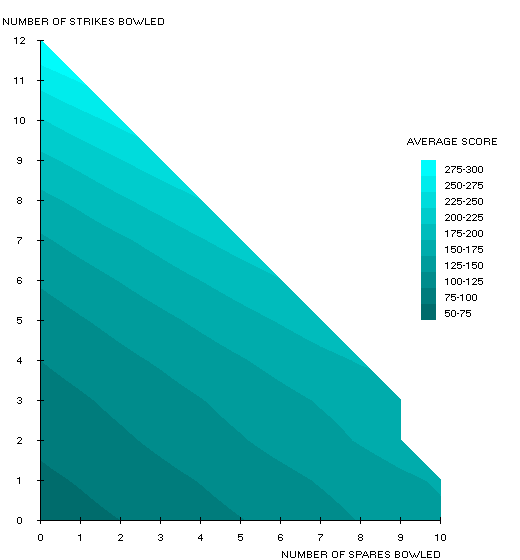
As expected, the average score increases with the number of strikes and spares, and the influence of strikes increases with larger scores. It's easy to see from the contour lines in this diagram how much we can expect to increase our average score with more strikes or spares. (The contour lines themselves are only a visual aid since we obviously can't have a fractional number of strikes or spares.) The information in this diagram is presented in tabular form below, along with the minimum and maximum scores possible for various quantities of strikes and spares:
| Number of spares | |||||||||||
|---|---|---|---|---|---|---|---|---|---|---|---|
| Number of strikes |
0 | 1 | 2 | 3 | 4 | 5 | 6 | 7 | 8 | 9 | 10 |
| 12 | 300 [300-300] |
||||||||||
| 11 | 259 [240-299] |
277 [270-290] |
|||||||||
| 10 | 223 [180-288] |
240 [210-289] |
257 [240-279] |
||||||||
| 9 | 193 [120-267] |
208 [150-278] |
224 [180-279] |
239 [210-268] |
|||||||
| 8 | 168 [90-246] |
181 [120-257] |
196 [140-268] |
210 [170-268] |
224 [200-257] |
||||||
| 7 | 146 [70-225] |
159 [90-236] |
171 [110-247] |
184 [130-257] |
198 [150-257] |
211 [180-246] |
|||||
| 6 | 128 [60-204] |
139 [70-215] |
151 [80-226] |
163 [100-236] |
175 [120-246] |
187 [140-246] |
199 [170-235] |
||||
| 5 | 112 [50-183] |
123 [60-194] |
133 [70-205] |
144 [80-215] |
155 [90-225] |
166 [110-235] |
177 [130-235] |
188 [150-224] |
|||
| 4 | 100 [40-162] |
109 [50-173] |
119 [60-184] |
128 [70-194] |
138 [80-204] |
148 [90-214] |
158 [100-224] |
168 [120-224] |
177 [140-213] |
||
| 3 | 89 [30-141] |
97 [40-152] |
106 [50-163] |
115 [60-173] |
124 [70-183] |
134 [80-193] |
143 [90-203] |
152 [100-213] |
160 [110-213] |
166 [130-202] |
|
| 2 | 80 [20-120] |
88 [30-131] |
96 [40-142] |
105 [50-152] |
114 [60-162] |
123 [70-172] |
133 [80-182] |
142 [90-192] |
152 [100-202] |
162 [120-202] |
|
| 1 | 70 [10-100] |
77 [20-111] |
85 [30-122] |
93 [40-132] |
101 [50-142] |
110 [60-152] |
118 [70-162] |
127 [80-172] |
136 [90-182] |
145 [100-192] |
153 [110-192] |
| 0 | 60 [0-90] |
68 [10-100] |
75 [20-110] |
83 [30-120] |
91 [40-130] |
99 [50-140] |
108 [60-150] |
116 [70-160] |
126 [80-170] |
135 [90-180] |
145 [100-190] |
For example, games with two strikes and four spares average 114 points, but could be as low as 60 or as high as 162, depending on the particular balls thrown in the game.
There are about half a trillion (438,578,270,526) clean games in which all 10 frames are closed, representing only 0.000008% of all possible games.
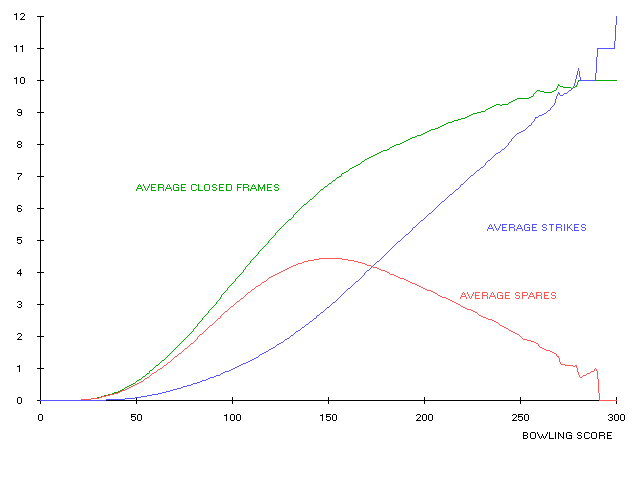
The average numbers of strikes and spares per game are approximately equal for games scoring about 173. Obviously the only game with 12 strikes (a perfect game) scores 300.
The average number of balls thrown in a game is highly influenced by the number of strikes, but there are side effects resulting from the special scoring in frame 10:
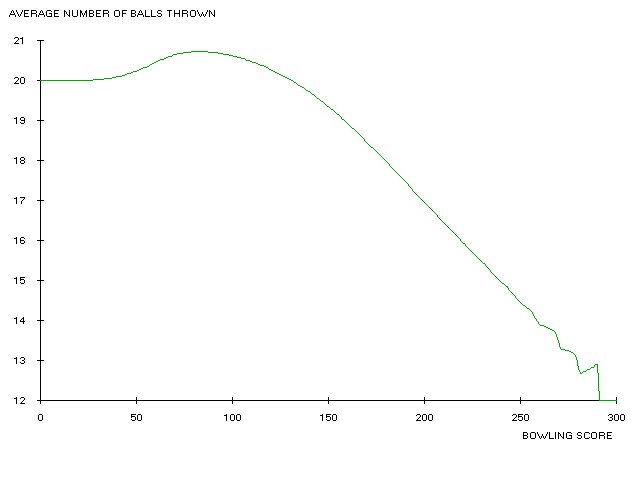
As low scores increase to about 83, the occasional third ball in the tenth frame increases the total number of balls thrown on the average.
The maximum possible number of balls thrown in a game is 21, resulting from nine non-strike frames followed by a tenth frame with three balls.
It's possible to have a game with as few as 11 balls, but the only way would be with all strikes in the first nine frames followed by an open tenth frame. Looking at these 11-ball games in more detail, let A and B be the two balls thrown in frame 10. Since the tenth frame is open, we have 0 ≤ A ≤ 9 (no strike) and 0 ≤ A + B ≤ 9 (no spare). The score of such a game would be 240 + A + 2(A + B):
Score through frame 7 210 Points earned in frame 8 20 + A Score through frame 8 230 + A Points earned in frame 9 10 + A + B Score through frame 9 240 + 2A + B Points earned in frame 10 A + B Final score 240 + 3A + 2BThe final score for the 11-ball game falls in the range [240,267]. However, the average number of balls thrown for games scoring in this range is well above 11, so the effect of these rare 11-ball games is not apparent in the chart above.
Since any of the 66 possibilities for the first frame can be followed by any of them for the second frame, and so on, it follows that the number of possible ways to play the first nine frames is 669.
First ball
ASecond ball
BPossibilities Strike
10(not thrown) 1 9 0 or 1 2 8 0 to 2 3 7 0 to 3 4 6 0 to 4 5 5 0 to 5 6 4 0 to 6 7 3 0 to 7 8 2 0 to 8 9 1 0 to 9 10 0
(gutter)0 to 10 11 Total 66
The number of possible outcomes for the two or three balls thrown in Frame 10 can be summarized in the following table:
Since there are 241 possible ways to score the tenth frame, the result given at the top of this page for the total number of games follows.
First ball
ASecond ball
BThird ball
CPossibilities Number of
strikesNumber of
sparesStrike
10Strike
10Strike
101 3 0 Non-strike
0 to 910 2 0 Non-strike
0 to 9Spare
10-B10 1 1 Non-spare
0 to 9-B55 * 1 0 Non-strike
0 to 9Spare
10-AStrike
1010 1 1 Non-strike
0 to 9100 0 1 Non-spare
0 to 9-A(not thrown) 55 ** 0 0 Total 241 * As B varies from 0 to 9, the sum of the 10-B possibilities 0 to 9-B is:
10 + 9 + 8 + 7 + 6 + 5 + 4 + 3 + 2 + 1 = 55** Same result when A varies varies from 0 to 9
Frame
Game 1 2 3 4 5 6 7 8 9 10 Strikes
1. X - / X X X X X X X X X X 11
2. X 1 / X X X X X X X X X X 11
3. X 2 / X X X X X X X X X X 11
4. X 3 / X X X X X X X X X X 11
5. X 4 / X X X X X X X X X X 11
6. X 5 / X X X X X X X X X X 11
7. X 6 / X X X X X X X X X X 11
8. X 7 / X X X X X X X X X X 11
9. X 8 / X X X X X X X X X X 11
10. X 9 / X X X X X X X X X X 11
11. - / X X X X X X X X X X - 10
12. 1 / X X X X X X X X X X - 10
13. 2 / X X X X X X X X X X - 10
14. 3 / X X X X X X X X X X - 10
15. 4 / X X X X X X X X X X - 10
16. 5 / X X X X X X X X X X - 10
17. 6 / X X X X X X X X X X - 10
18. 7 / X X X X X X X X X X - 10
19. 8 / X X X X X X X X X X - 10
20. 9 / X X X X X X X X X X - 10
21. X X X X X X X X X X - / 10
22. X X X X X X X X X X 1 8 10
23. X X X X X X X X X X 2 6 10
24. X X X X X X X X X X 3 4 10
25. X X X X X X X X X X 4 2 10
26. X X X X X X X X X X 5 - 10
Total 270
and the fifteen possible 281-point games:
Frame
Game 1 2 3 4 5 6 7 8 9 10 Strikes
1. - / X X X X X X X X X X 1 10
2. 1 / X X X X X X X X X X 1 10
3. 2 / X X X X X X X X X X 1 10
4. 3 / X X X X X X X X X X 1 10
5. 4 / X X X X X X X X X X 1 10
6. 5 / X X X X X X X X X X 1 10
7. 6 / X X X X X X X X X X 1 10
8. 7 / X X X X X X X X X X 1 10
9. 8 / X X X X X X X X X X 1 10
10. 9 / X X X X X X X X X X 1 10
11. X X X X X X X X X X 1 9 10
12. X X X X X X X X X X 2 7 10
13. X X X X X X X X X X 3 5 10
14. X X X X X X X X X X 4 3 10
15. X X X X X X X X X X 5 1 10
Total 150
The average number of strikes in a 280-point game is 270/26 = 10.38, but the
average number in a 281-point game is only 150/15 = 10. A similar type of
behavior occurs with the average number of spares.
Score Number of possible games 0 1 1 20 2 210 3 1540 4 8855 5 42504 6 177100 7 657800 8 2220075 9 6906900 10 20030010 11 54627084 12 141116637 13 347336412 14 818558424 15 1854631380 16 4053948342 17 8574134256 18 17590903116 19 35084425512 20 68153183370 21 129156542039 22 239128282128 23 433093980298 24 768175029950 25 1335679056261 26 2278764308864 27 3817721269708 28 6285424931278 29 10176048813473 30 16210652213304 31 25423690787719 32 39274771758064 33 59789973730461 34 89736657900900 35 132834787033075 36 194006223597572 37 279661205716974 38 398018151390200 39 559449136091831 40 776838931567572 41 1065940588576732 42 1445705502357343 43 1938561121705315 44 2570605432880903 45 3371684590465908 46 4375319099346208 47 5618445228564793 48 7140942201229333 49 8984922304030443 50 11193770355829009 51 13810930667765157 52 16878453276117746 53 20435326129713654 54 24515635362932954 55 29146610869639549 56 34346628376654913 57 40123251227815383 58 46471404549689351 59 53371780703441318 60 60789577452586487 61 68673668434334934 62 76956298564663402 63 85553384395717227 64 94365480254213528 65 103279445170253902 66 112170812747354087 67 120906827121834566 68 129350064451661348 69 137362512979745598 70 144809940796620325 71 151566341291631624 72 157518221668013078 73 162568486673578693 74 166639683923175378 75 169676402232105648 76 171646676234883305 77 172542309343731946 78 172378125687965848 79 171190226627438257 80 169033430825208027 81 165978103316094584 82 162106654714921075 83 157509948809043576 84 152283892386077931 85 146526364181517039 86 140334651650668803 87 133803399444707801 88 127023103852577896 89 120079021507938035 90 113050455155943519 91 106010240661754449 92 99024411737621323 93 92151904402003308 94 85444345654857875 95 78945863453573001 96 72693023944120045 97 66714881583314335 98 61033240145235763 99 55663091133973346 100 50613244155051856 101 45887089510794122 102 41483436078768079 103 37397371704961189 104 33621048067136846 105 30144388614623696 106 26955619314626157 107 24041709119775647 108 21388640692533960 109 18981680119465910 110 16805547548715206 111 14844654231857239 112 13083276623221517 113 11505812292077067 114 10096971927616045 115 8842020009154293 116 7726929590817265 117 6738528470417086 118 5864552560171552 119 5093653838062639 120 4415377510495980 121 3820097597373727 122 3298981687014508 123 2843905747206868 124 2447444695948898 125 2102793053565659 126 1803790254604935 127 1544848145184291 128 1320992367181792 129 1127775864826813 130 961294388171457 131 818085023387881 132 695128788327698 133 589753122859383 134 499630252931260 135 422696870992462 136 357151976811922 137 301400973036441 138 254052574077937 139 213889601295347 140 179862464456172 141 151065169242834 142 126722015973414 143 106169469752641 144 88840622360686 145 74252067274687 146 61990415093876 147 51701385089887 148 43082666091665 149 35870481552300 150 29843343433392 151 24808172866872 152 20607116162379 153 17101443169235 154 14181008701762 155 11747089496422 156 9723545122578 157 8040378083433 158 6644452641044 159 5486702080236 160 4529003381568 161 3736165201688 162 3081105018158 163 2539255963377 164 2091793858275 165 1721930513702 166 1416734360140 167 1164733232308 168 957190045595 169 785911852914 170 645295369580 171 529489941608 172 434606120455 173 356481490646 174 292487050484 175 239755303889 176 196550315542 177 160954253448 178 131791387388 179 107847709116 180 88241591630 181 72162948863 182 59038079745 183 48284335855 184 39509743432 185 32308399043 186 26423428886 187 21582203262 188 17624621529 189 14368737009 190 11720626558 191 9552812749 192 7790240907 193 6351933169 194 5185250585 195 4232118751 196 3457204258 197 2821392492 198 2302090127 199 1874802017 200 1526313637 201 1239515641 202 1007719386 203 818568928 204 666193896 205 542061609 206 442072320 207 360234562 208 293886739 209 239045260 210 194337731 211 157306293 212 127325163 213 102799565 214 83194097 215 67300605 216 54691522 217 44477808 218 36317458 219 29606794 220 24117404 221 19554213 222 15820964 223 12736481 224 10258846 225 8244157 226 6659561 227 5381526 228 4385243 229 3576841 230 2930385 231 2376760 232 1924226 233 1541327 234 1231527 235 975760 236 777090 237 617547 238 498228 239 404981 240 335065 241 275998 242 226966 243 183727 244 148442 245 117291 246 93525 247 73010 248 57960 249 45826 250 37965 251 31193 252 26131 253 21406 254 17422 255 13613 256 10696 257 7975 258 6005 259 4374 260 3534 261 3016 262 2635 263 2264 264 1933 265 1603 266 1323 267 1045 268 810 269 585 270 406 271 277 272 258 273 227 274 206 275 173 276 150 277 115 278 90 279 53 280 26 281 15 282 15 283 14 284 14 285 13 286 13 287 12 288 12 289 11 290 11 291 1 292 1 293 1 294 1 295 1 296 1 297 1 298 1 299 1 300 1 Total 5726805883325784576
The first group of frames must track four scoring possibilities forward that require knowledge of the first two balls A and B thrown in the second group of frames. These four possibilities are: 1) an open frame resulting in no extra score (0 points added); 2) a spare adding in the score from the next ball (A); 3) a strike adding in the score from the next two balls (A + B); and 4) a double strike in the last two frames adding in twice the score from the next ball as well as the score from the second ball following (2A + B). Results are kept in four separate tables for each partial score. To be properly combined in the convolution, the array in the second group is identified by all possible values for its first two balls A and B, which are tracked backward into the convolution performed with the first group of frames. To simplify programming, A and B are each allowed to range from 0 to 10 (121 total combinations) even though certain combinations of A and B are invalid (these invalid combinations will have zero entries for the number of games and are ignored in the computations).
An array of possibilities for the first three frames is computed and then convolved with itself to form results for the first six frames. This result is convolved with the array for the first three frames to produce results for the first nine frames. Finally, that result is convolved with computations for frame 10 in order to generate results corresponding to the entire game.
An alternative and simpler approach to scoring bowling games is the current-frame scoring method supported by the World Bowling organization. In this method, only the knowledge of the balls in the currently-bowled frame is necessary to determine the score; there is no dependency on future balls to be thrown, and there are no bonus balls in Frame 10. Thus, the score possibilities are independent and identically distributed for every frame. Current-frame scoring is defined as follows:
As derived in the table above, there again are 66 possible ways to bowl a single frame. Since all ten frames have the same possibilities, the total number of possible games is
6610 = 1,568,336,880,910,795,776 = 1.6 x 1018 approximatelyThis is about one-quarter (66/241) of the number of different games with traditional ten-pin bowling scoring.
If all scores are considered to be equally likely, we can count up the results in the preceding table to determine the probability p(s) of one frame's score being s:
Single-
frame
scoresFirst Ball 0 1 2 3 4 5 6 7 8 9 10 Second
Ball0 0 1 2 3 4 5 6 7 8 9 30 1 1 2 3 4 5 6 7 8 9 19 2 2 3 4 5 6 7 8 9 18 3 3 4 5 6 7 8 9 17 4 4 5 6 7 8 9 16 5 5 6 7 8 9 15 6 6 7 8 9 14 7 7 8 9 13 8 8 9 12 9 9 11 10 10
{ (s+1)/66, 0 ≤ s ≤ 9 (open frame)
{
{ 1/66, 10 ≤ s ≤ 19 (spare)
p(s) = {
{ 1/66, s = 30 (strike)
{
{ 0, otherwise
The mean of this score distribution is 505/66 = 7.65 pins.
The probability of a strike is 1/66 = 1.515%, and
the probability of a spare is ten times that, or 15.15%. The probability of an
open frame is 55/66 = 83.33%. A histogram of the score distribution is shown
below, alongside a comparable plot for the scoring distribution of the first
frame using traditional scoring:
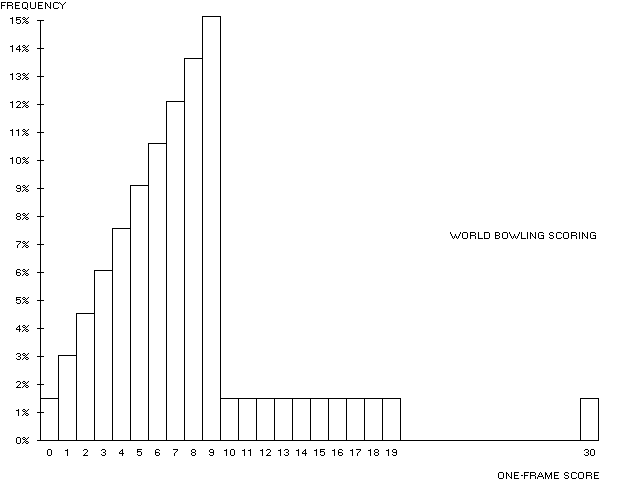
|
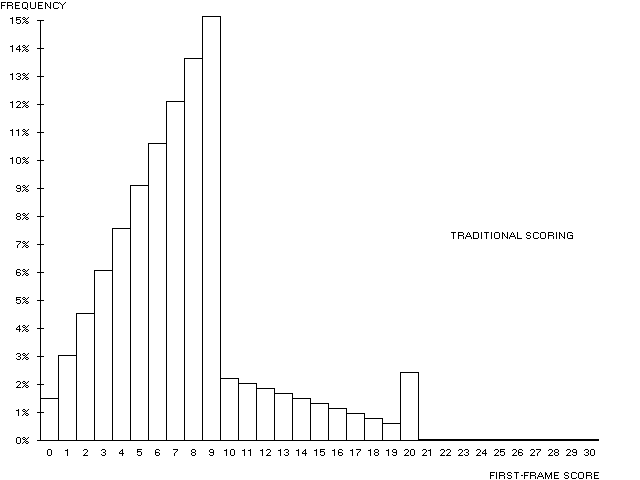
|
| First frame | Tenth frame | Game | |||||||
|---|---|---|---|---|---|---|---|---|---|
| World | Traditional | World | Traditional | World | Traditional | ||||
| Mode | 9 | 9 | 9 | 20 | 72 | 77 | |||
| Mean | 7.65 | 7.42 | 7.65 | 13.84 | 76.5 | 79.7 | |||
| Median | 7 | 7 | 7 | 15 | 75 | 79 | |||
However, as seen in the table above, the score statistics for the overall game using World Bowling (current-frame) scoring are slightly lower. This is due the effect of the bonus balls and associated tenth-frame scoring in the traditional game, shown below:
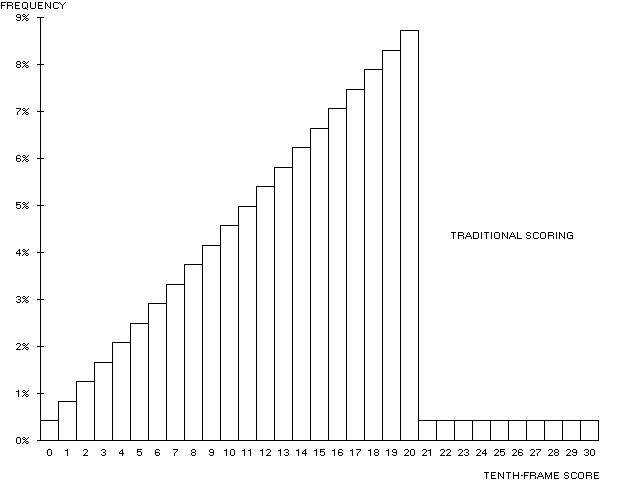
This effect skews the overall results for the entire World Bowling game, making lower scores slightly more likely with current-frame scoring:
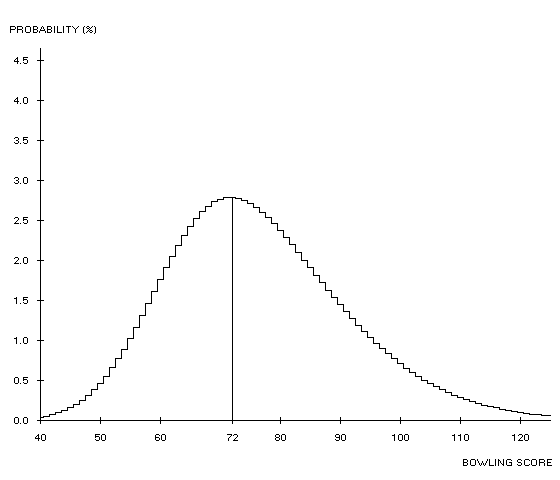
Here, the asymmetry of the probability distribution about its maximum point
(mode) is more apparent than with traditional scoring. The
standard deviation of this score distribution is 15.2 pins.
The full table of possible scores and frequencies is shown
below.
The corresponding cumulative probability histogram shows the score percentiles, all of which are lower than with traditional scoring:

The average number of strikes or spares needed to reach a certain score is
generally less than with traditional scoring. Conversely, the average score
associated with a given number of strikes and spares can be signfiicantly
higher.
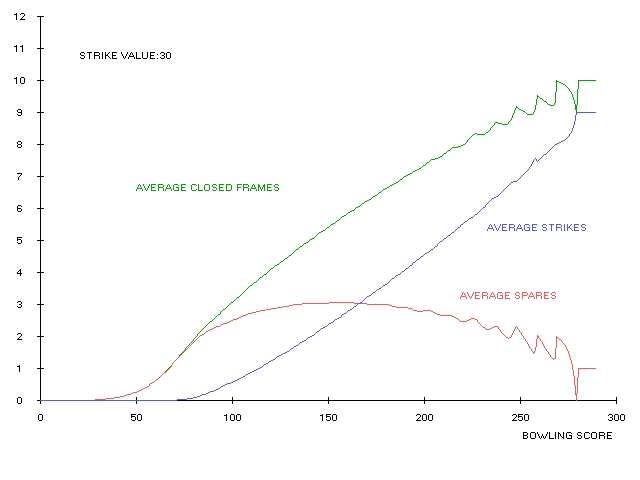
Results are omitted for the one (perfect) game scoring above 290. The
average numbers of strikes and spares per game are approximately the same for
games scoring 166. The number of closed frames in a game is simply the number
of strikes plus the number of spares, since there are no bonus balls in Frame
10. The average number of spares has a locally non-monotonic or "scalloped"
shape at higher scores due to the effects of the score gap between spares and a
strike.
The number of balls thrown in a game is 20 minus the number of strikes, and ranges from 11 to 20 for games scoring other than 300:
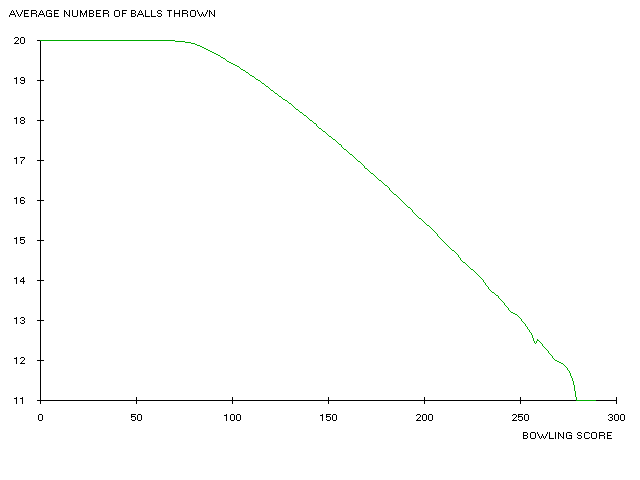
| T strikes | P spares | 10-T-P open frames | Game total | |
|---|---|---|---|---|
| Minimum score | 30T | 10P | 0 | 30T + 10P |
| Maximum score | 30T | 19P | 9(10-T-P) | 21T + 10P + 90 |
The spread between the minimum and maximum game scores is 9(10-T), which is the sum of the spreads for all the non-strike frames. The average, minimum and maximum scores possible for various quantities of strikes and spares is shown in the table below, along with the change in average score from traditional scoring:
| Number of spares | |||||||||||
|---|---|---|---|---|---|---|---|---|---|---|---|
| Number of strikes |
0 | 1 | 2 | 3 | 4 | 5 | 6 | 7 | 8 | 9 | 10 |
| 10 | 300 (+77) [300-300] |
||||||||||
| 9 | 276 (+83) [270-279] |
285 (+77) [280-289] |
|||||||||
| 8 | 252 (+84) [240-258] |
261 (+80) [250-268] |
269 (+73) [260-278] |
||||||||
| 7 | 228 (+82) [210-237] |
237 (+78) [220-247] |
245 (+74) [230-257] |
254 (+70) [240-267] |
|||||||
| 6 | 204 (+76) [180-216] |
213 (+74) [190-226] |
221 (+70) [200-236] |
230 (+67) [210-246] |
238 (+63) [220-256] |
||||||
| 5 | 180 (+68) [150-195] |
189 (+66) [160-205] |
197 (+64) [170-215] |
206 (+62) [180-225] |
214 (+59) [190-235] |
223 (+57) [200-245] |
|||||
| 4 | 156 (+56) [120-174] |
165 (+56) [130-184] |
173 (+54) [140-194] |
182 (+54) [150-204] |
190 (+52) [160-214] |
199 (+51) [170-224] |
207 (+49) [180-234] |
||||
| 3 | 132 (+43) [90-153] |
141 (+44) [100-163] |
149 (+43) [110-173] |
158 (+43) [120-183] |
166 (+42) [130-193] |
175 (+41) [140-203] |
183 (+40) [150-213] |
192 (+40) [160-223] |
|||
| 2 | 108 (+28) [60-132] |
117 (+29) [70-142] |
125 (+29) [80-152] |
133 (+28) [90-162] |
142 (+28) [100-172] |
151 (+28) [110-182] |
159 (+26) [120-192] |
168 (+26) [130-202] |
176 (+24) [140-212] |
||
| 1 | 84 (+14) [30-111] |
92 (+15) [40-121] |
101 (+16) [50-131] |
109 (+16) [60-141] |
118 (+17) [70-151] |
126 (+16) [80-161] |
135 (+17) [90-171] |
144 (+17) [100-181] |
152 (+16) [110-191] |
161 (+16) [120-201] |
|
| 0 | 60 (0) [0-90] |
69 (+1) [10-100] |
77 (+2) [20-110] |
85 (+2) [30-120] |
94 (+3) [40-130] |
103 (+4) [50-140] |
111 (+3) [60-150] |
120 (+4) [70-160] |
128 (+2) [80-170] |
137 (+2) [90-180] |
145 (0) [100-190] |
10! T P 10-T-P g(T,P) = --------------- (1/66) (10/66) (55/66) T! P! (10-T-P)! for 0 ≤ T ≤ 10 and 0 ≤ P ≤ 10-Twhich is based on the one-frame probabilities defined above for a strike, a spare or an open frame. For example, the fraction of all possible games that have exactly 1 strike and 1 spare is
10! 8 g(1,1) = -------- (1/66) (10/66) (55/66) = 4.81% 1! 1! 8!Evaluating these results for the feasible ranges of strikes and spares, we have the following plot:
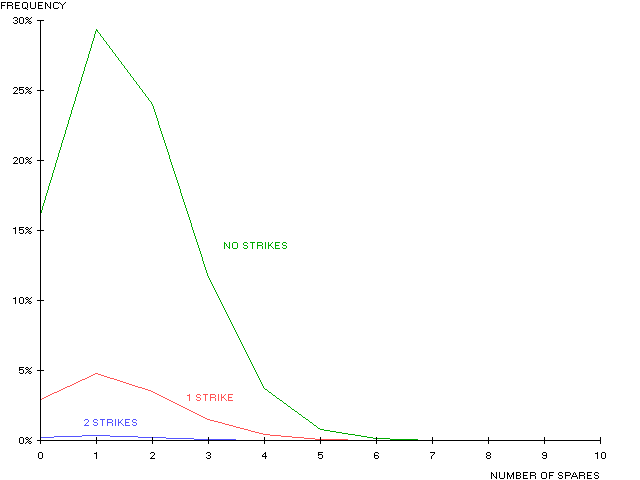
The frequencies associated with 3 or more strikes are too low to show up on the chart.
Here's the same information in the form of a 3D histogram:
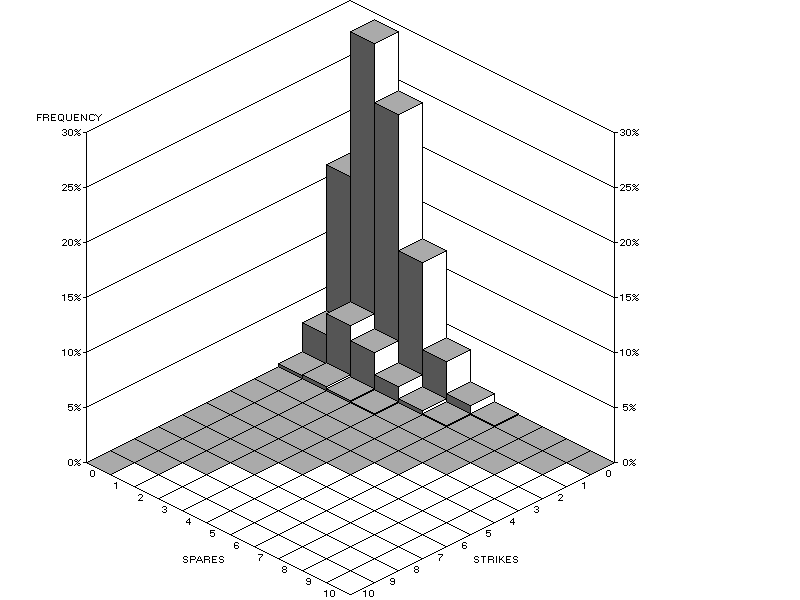
1110 = 25,937,424,601so there are about 26 billion clean games in which all 10 frames are closed, representing only 0.0000016% of all possible games. Obviously, no game with a score under 100 can be a clean game since a strike earns more than any spare and 10 spares must earn at least 100 points.
Games scoring 269, 280-289, or 300 must always be clean games:
Analyses similar to those in the preceding sections show that the statistics of the game score distribution do not vary greatly for M < 30:
| Game score statistic | ||||
|---|---|---|---|---|
| Mean | Mode | Median | ||
| Strike score |
20 | 75.0 | 73 | 74 |
| 25 | 75.8 | 72 | 75 | |
| 30 | 76.5 | 72 | 75 | |
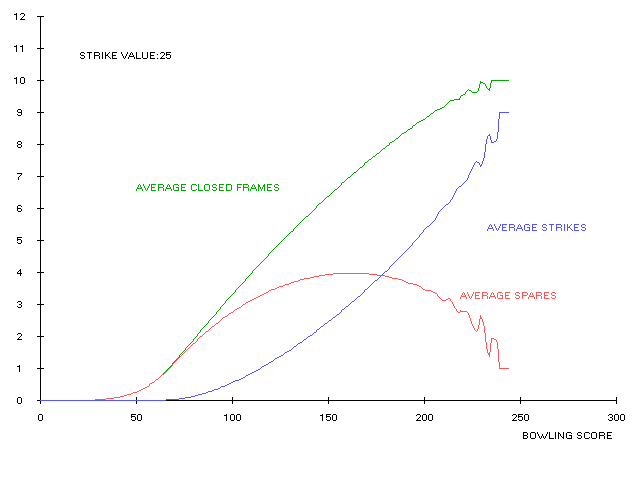
|
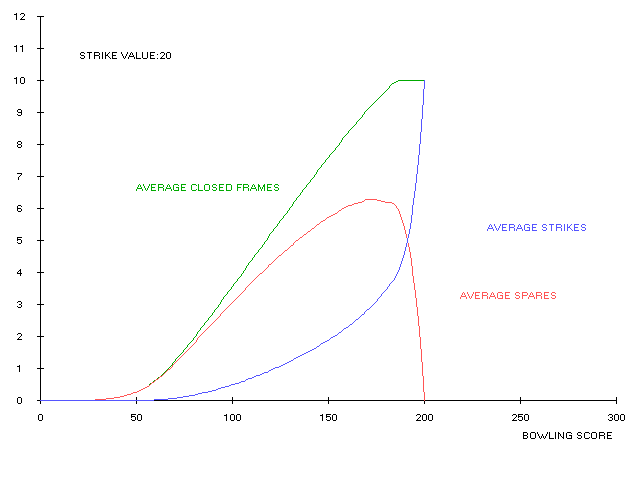
|
Score Number of possible games 0 1 1 20 2 210 3 1540 4 8855 5 42504 6 177100 7 657800 8 2220075 9 6906900 10 20029910 11 54625390 12 141101325 13 347238500 14 818062300 15 1852514070 16 4046044310 17 8547655600 18 17509826400 19 34854380550 20 67541888900 21 127622461010 22 235467859445 23 424744086650 24 749883201650 25 1297052375366 26 2199889956935 27 3661566327540 28 5985003339040 29 9613307642730 30 15182582176769 31 23589203727170 32 36073308835395 33 54319527255130 34 80574860327825 35 117781961461410 36 169723917774345 37 241173996359780 38 338040825065020 39 467496338531750 40 638070844965110 41 859697155357480 42 1143684325691265 43 1502601676134770 44 1950055813772110 45 2500347731015040 46 3168003824781765 47 3967183760495780 48 4910979046898705 49 6010628213027240 50 7274686502965781 51 8708198717340170 52 10311931823519525 53 12081727884792140 54 14008036633963050 55 16075680003223462 56 18263888111000370 57 20546628328775240 58 22893227578599125 59 25269264984684270 60 27637689796314787 61 29960100551745920 62 32198107959174615 63 34314697579840260 64 36275509938490805 65 38049964968674380 66 39612173449501415 67 40941598074127430 68 42023448224326255 69 42848812855238280 70 43414552998372050 71 43722987768421870 72 43781414679391290 73 43601506663391340 74 43198625417862815 75 42591085277769086 76 41799395825565305 77 40845506909141420 78 39752077718176655 79 38541791092813400 80 37236734265954227 81 35857866748978560 82 34424594142676465 83 32954462581014750 84 31462981911416615 85 29963576660029292 86 28467653020803480 87 26984759038298590 88 25522806327282305 89 24088318835376660 90 22686676709427605 91 21322330217135730 92 19998968445645700 93 18719638387834240 94 17486820124802685 95 16302471277776220 96 15168057254583800 97 14084582319246780 98 13052630658586615 99 12072418722804900 100 11143854188694724 101 10266593344594420 102 9440087767430720 103 8663612863528440 104 7936274875808590 105 7256998619048336 106 6624504282096975 107 6037286287205860 108 5493607797089085 109 4991517434455090 110 4528888417358896 111 4103475135395670 112 3712978649550105 113 3355111029457150 114 3027649006567760 115 2728470033340074 116 2455568079499915 117 2207051522130810 118 1981129914883315 119 1776098207280280 120 1590324559115145 121 1422245289812010 122 1270367906237890 123 1133280782366540 124 1009666167227130 125 898312049098324 126 798118306584825 127 708093859220590 128 627344542961095 129 555056550996240 130 490479529459266 131 432912437384680 132 381694130477375 133 336199390618620 134 295839903993625 135 260068624420566 136 228385209907195 137 200339988923560 138 175534435457010 139 153617687340420 140 134280575449174 141 117248552344640 142 102274752682935 143 89134183607230 144 77619732640965 145 67540296613840 146 58720883516950 147 51004028108040 148 44251302626970 149 38343110315140 150 33177167222081 151 28666108631730 152 24734664812935 153 21316832602560 154 18353420191210 155 15790257735412 156 13577241099990 157 11668204865040 158 10021398119875 159 8600056590950 160 7372547220108 161 6312149354020 162 5396549489370 163 4607137627000 164 3928202327005 165 3346128105804 166 2848702430145 167 2424639770410 168 2063426478455 169 1755582128400 170 1492817304730 171 1268092189410 172 1075584180220 173 910576986280 174 769288201635 175 648657261636 176 546120947470 177 459409229300 178 386400235770 179 325079514760 180 273596522207 181 230305907930 182 193793062990 183 162883715630 184 136637715655 185 114327530998 186 95402395945 187 79439498830 188 66084078730 189 54980816560 190 45786537349 191 38181246870 192 31877185060 193 26625569460 194 22220692830 195 18501030150 196 15347001405 197 12675027870 198 10427511060 199 8558355090 200 7019752752 201 5763798430 202 4744025670 203 3916846800 204 3242871225 205 2688078252 206 2224819530 207 1832625420 208 1498788840 209 1218699360 210 987127782 211 798400920 212 646587315 213 525693840 214 429873150 215 353641932 216 292109910 217 241219560 218 197996490 219 160810440 220 129328302 221 103144140 222 81787560 223 64732620 224 51407280 225 41203392 226 33487230 227 27610560 228 22922250 229 18780420 230 15177312 231 12097680 232 9518700 233 7409880 234 5732970 235 4441872 236 3482550 237 2792940 238 2302860 239 1933920 240 1599447 241 1300020 242 1035990 243 807480 244 614385 245 456372 246 332880 247 243120 248 186075 249 160500 250 136530 251 114270 252 93825 253 75300 254 58800 255 44430 256 32295 257 22500 258 15150 259 10350 260 9225 261 8130 262 7065 263 6030 264 5025 265 4050 266 3105 267 2190 268 1305 269 450 270 415 271 380 272 345 273 310 274 275 275 240 276 205 277 170 278 135 279 100 280 10 281 10 282 10 283 10 284 10 285 10 286 10 287 10 288 10 289 10 290 0 291 0 292 0 293 0 294 0 295 0 296 0 297 0 298 0 299 0 300 1 Total 1568336880910795776
Less commonly played games include candlepin and duckpin bowling. Although the pins and balls are sized differently between these two games (see diagram), their scoring is identical. The main gameplay difference is that in candlepin bowling, fallen pins are not cleared away between the balls of a frame. Ten pins and ten scoring frames (boxes) are used as in ten-pin bowling, as well as the usual bonus points consisting of the next ball for a spare and the next two balls for a strike. Extra balls can be rolled in the tenth frame as in ten-pin bowling.
The only difference in scoring between candlepin/duckpin and ten-pin bowling is that a third ball is available in each of the first nine frames when neither a strike nor a spare is thrown. No bonus points beyond the pin count are awarded for the third ball in a frame, so the maximum score for an open frame is 10 (vs. 9 in ten-pin bowling). Three balls are always thrown in the last frame. The third balls present in lower-scoring candlepin and duckpin games increases the total number of possibilities to about a million times that of ten-pin bowling:
2869 x 461 = 5,901,945,890,697,151,108,875,776 = 5.9 x 1024 approximatelySee the section below for a derivation.
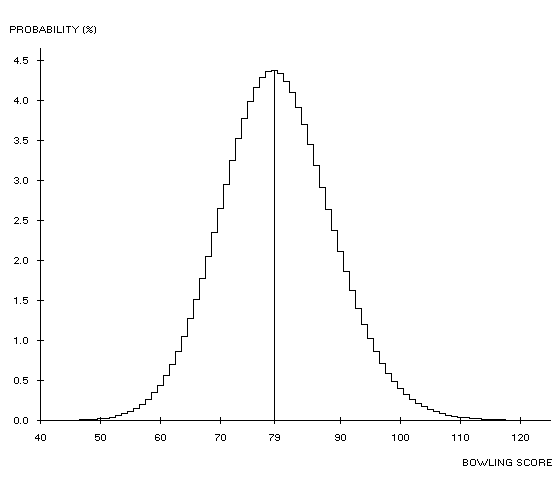
The mode (most common score) of the distribution is 79 and the average score is about 79.4, which are both very nearly the same as in ten-pin bowling. The standard deviation of the score distribution is 9.3, which is considerably less than in ten-pin bowling and can be seen in the narrower score distribution that has less-numerous higher and lower scores. The full table of possible scores and frequencies is shown below.
The corresponding cumulative probability histogram shows the percentiles for various scores:
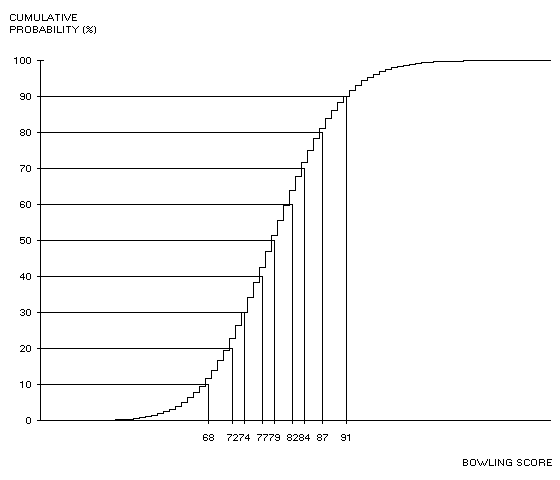
For example, if we bowl 91 or higher, we're in the 90th percentile of all possible bowling scores. The median (50th percentile) of the score distribution is 79, the same as in ten-pin bowling.
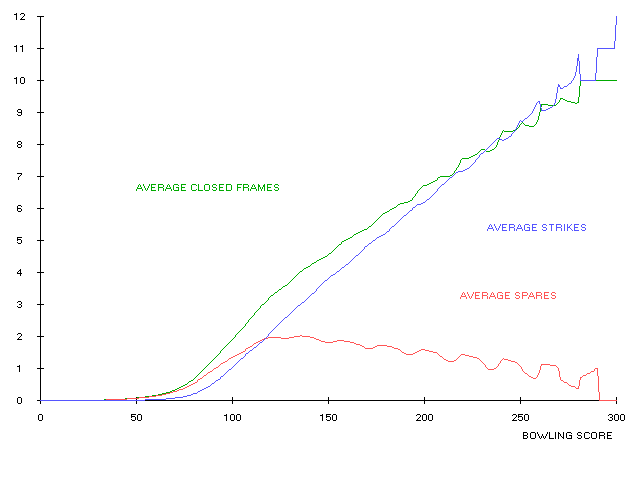
The average numbers of strikes and spares per game are approximately the same for games scoring 117.
The number of balls thrown in a game ranges from 12 (all strikes in the first 9 frames) to 30 (first 9 frames all open):

| Number of spares | |||||||||||
|---|---|---|---|---|---|---|---|---|---|---|---|
| Number of strikes |
0 | 1 | 2 | 3 | 4 | 5 | 6 | 7 | 8 | 9 | 10 |
| 12 | 300 (0) [300-300] |
||||||||||
| 11 | 258 (-1) [240-299] |
277 (0) [270-290] |
|||||||||
| 10 | 223 (0) [180-288] |
239 (-1) [210-289] |
257 (0) [240-280] |
||||||||
| 9 | 193 (0) [120-268] |
208 (0) [150-278] |
223 (-1) [180-279] |
239 (0) [210-269] |
|||||||
| 8 | 168 (0) [90-248] |
181 (0) [110-258] |
195 (-1) [130-268] |
209 (-1) [160-268] |
224 (0) [190-258] |
||||||
| 7 | 147 (+1) [70-228] |
159 (0) [80-238] |
171 (0) [100-248] |
184 (0) [120-257] |
197 (-1) [150-257] |
210 (-1) [180-247] |
|||||
| 6 | 131 (+3) [60-208] |
141 (+2) [60-218] |
151 (0) [70-228] |
162 (-1) [90-237] |
173 (-2) [110-246] |
185 (-2) [130-246] |
198 (-1) [160-236] |
||||
| 5 | 117 (+5) [50-188] |
125 (+2) [50-198] |
134 (+1) [60-208] |
143 (-1) [70-217] |
153 (-2) [80-226] |
164 (-2) [100-235] |
175 (-2) [120-235] |
186 (-2) [150-225] |
|||
| 4 | 106 (+6) [40-168] |
113 (+4) [40-178] |
120 (+1) [50-188] |
128 (0) [60-197] |
136 (-2) [70-206] |
145 (-3) [80-215] |
155 (-3) [90-224] |
165 (-3) [110-224] |
175 (-2) [130-214] |
||
| 3 | 98 (+9) [30-148] |
102 (+5) [30-158] |
108 (+2) [40-168] |
114 (-1) [50-177] |
121 (-3) [60-186] |
129 (-5) [70-195] |
137 (-6) [80-204] |
145 (-7) [90-213] |
154 (-6) [100-213] |
164 (-2) [120-203] |
|
| 2 | 91 (+11) [20-128] |
93 (+5) [20-138] |
97 (+1) [30-148] |
102 (-3) [40-157] |
108 (-6) [50-166] |
114 (-9) [60-175] |
121 (-12) [70-184] |
128 (-14) [80-193] |
136 (-16) [90-202] |
144 (-18) [100-202] |
|
| 1 | 82 (+12) [10-109] |
86 (+9) [10-119] |
91 (+6) [20-129] |
97 (+4) [30-138] |
103 (+2) [40-147] |
110 (0) [50-156] |
117 (-1) [60-165] |
124 (-3) [70-174] |
132 (-4) [80-183] |
140 (-5) [90-192] |
149 (-4) [100-192] |
| 0 | 74 (+14) [0-100] |
80 (+12) [10-109] |
86 (+11) [20-118] |
92 (+9) [30-127] |
98 (+7) [40-136] |
105 (+6) [50-145] |
112 (+4) [60-154] |
120 (+4) [70-163] |
128 (+2) [80-172] |
136 (+1) [90-181] |
146 (+1) [101-190] |
As in ten-pin bowling, there are 438,578,270,526 clean games in which all 10 frames are closed, since the third ball has no effect on the number of closed frames.
In mathematical terms, the number of possibilities for one frame can be written as
First ball
ASecond ball
BThird ball
CPossibilities Subtotal Strike
10(not thrown) (not thrown) 1 1 9 0 0 or 1 2 3 Spare
1(not thrown) 1 8 0 0 to 2 3 6 1 0 or 1 2 Spare
2(not thrown) 1 7 0 0 to 3 4 10 1 0 to 2 3 2 0 or 1 2 Spare
3(not thrown) 1 ... 0 0 0 to 10 11 66 1 0 to 9 10 ... 9 0 or 1 2 Spare
10(not thrown) 1 Total 286
Since any of the 286 possibilities for the first frame can be followed by any of them for the second frame, and so on, it follows that the number of possible ways to play the first nine frames is 2869.
There are more possibilities in the tenth frame due to the bonus balls:
Since there are 461 possible ways to score the tenth frame, the result given at the top of this section for the total number of games follows.
First ball
ASecond ball
BThird ball
CPossibilities Number of
strikesNumber of
sparesStrike
10Strike
10Strike
101 3 0 Non-strike
0 to 910 2 0 Non-strike
0 to 9Spare
10-B10 1 1 Non-spare
0 to 9-B55* 1 0 Non-strike
0 to 9Spare
10-AStrike
1010 1 1 Non-strike
0 to 9100 0 1 Non-spare
0 to 9-AOpen
0 to 10-A-B275** 0 0 Total 461 * As B varies from 0 to 9, the sum of the 10-B possibilities 0 to 9-B is:
** The possibilities are:

Score Number of possible games 0 1 1 30 2 465 3 4960 4 40920 5 278256 6 1623160 7 8347680 8 38608020 9 163011640 10 635745396 11 2311800564 12 7898630488 13 25518377930 14 78375432192 15 229884291082 16 646451520650 17 1748732389740 18 4563966767050 19 11521332965360 20 28195300168536 21 67022483942610 22 155020952858610 23 349427328192852 24 768628298733384 25 1651966406406522 26 3472864928181523 27 7148323121225494 28 14418997854579253 29 28525151936663804 30 55385606549260712 31 105615202604948957 32 197913164668393077 33 364650010275350069 34 660913262213665103 35 1178891078820558207 36 2070336182395359030 37 3581024808259975717 38 6102671860803001556 39 10249738663868045596 40 16971001012538287584 41 27708608953281893195 42 44620559750271008778 43 70885795636729790802 44 111114140570787462861 45 171885416888868395878 46 262442515545387531149 47 395560879117283161706 48 588610537683116599598 49 864815138783419166142 50 1254693995960731102537 51 1797646980476968342279 52 2543607620468429055057 53 3554647542239861745988 54 4906367257711503634629 55 6688857890478569714101 56 9006971369402871029155 57 11979600573276136579429 58 15737655290927971430631 59 20420435074909224118183 60 26170156283204797059848 61 33124496033363042570738 62 41407174596093172213215 63 51116807812344559744945 64 62314512039748314335577 65 75011015957016248688076 66 89154296623525046688698 67 104618973683468061217445 68 121198822999390603283101 69 138603767531028548448834 70 156462535013152540694779 71 174331820739543560595556 72 191712264491635662808520 73 208070876741419095525039 74 222868793939561511065001 75 235592495419431313947969 76 245785981776200464270566 77 253081005925114044395742 78 257222357592307499334918 79 258085489212664863100540 80 255684443534144785717602 81 250169044994429779565231 82 241811529062189273628191 83 230984036929714064043964 84 218129504604451418012410 85 203729244560827402543341 86 188270818920289689358561 87 172219571032916229160218 88 155996443369219089550939 89 139963584855536353903400 90 124417944639962013338573 91 109591814434343862275838 92 95658366850399709140548 93 82739820333054653646941 94 70915992856405721834427 95 60231586605998378164890 96 50701373040939563083457 97 42313310139045150012090 98 35030347089788099707772 99 28792090403446216702436 100 23517516275755793313709 101 19109497754383725029438 102 15461185213933660596255 103 12463464920695184620652 104 10012149212282694139132 105 8013504895878972813898 106 6387278262523817263927 107 5067215006895278299411 108 3999696824989735545934 109 3141323178206713139221 110 2456282292477494349356 111 1914173806652190955729 112 1488628601534690534006 113 1156708472915228014238 114 898796775179566257800 115 698605101264116959958 116 543043772290870082948 117 421899587994816038465 118 327382490575979012391 119 253615427739236267683 120 196142995020034189803 121 151518728092350513755 122 117005588526426529592 123 90390011471395193189 124 69881799065766862043 125 54056633824373828874 126 41807724302811120785 127 32293880027759478321 128 24886646513386714471 129 19119519104756754309 130 14642903951918636993 131 11187660900873748473 132 8539216431233998932 133 6521911309818926355 134 4991364651717932942 135 3830819543529840778 136 2948382354434072170 137 2273813255421464573 138 1754939833121898989 139 1353841660075053015 140 1043159847122700960 141 802839819938030316 142 617637816260865282 143 475484449774261096 144 366633474638098050 145 283254961953810767 146 219185877964053862 147 169687636815771259 148 131210807422085454 149 101157628459778481 150 77654423438096051 151 59337793519838010 152 45176362079801134 153 34339496382271391 154 26126586159034671 155 19942152363507767 156 15292971286073798 157 11783927087793304 158 9111757530154630 159 7054073191970686 160 5455028685159556 161 4207814162584108 162 3237755891380477 163 2488376524582342 164 1913647181811822 165 1475006581167232 166 1140669438081146 167 884967616203672 168 687841815126895 169 534189572470797 170 413203601767024 171 317472572763179 172 242022522405026 173 183278522630477 174 138301253566063 175 104407778538213 176 79189180844522 177 60534483379146 178 46681580010945 179 36238893993340 180 28197584774439 181 21887665069975 182 16903008379242 183 12987149908756 184 9947909051893 185 7617109331594 186 5848701739783 187 4515515266808 188 3510103638537 189 2743516965650 190 2147183589728 191 1672097746566 192 1288259812670 193 979276673597 194 735738141264 195 548354730133 196 407981489222 197 305379544392 198 231746331186 199 178901567625 200 140054116561 201 110125920523 202 86162686450 203 66762831555 204 51266159752 205 39076923625 206 29677756545 207 22572085831 208 17313342634 209 13462724719 210 10626431928 211 8449283427 212 6679432528 213 5180683382 214 3936713799 215 2929315798 216 2142226380 217 1551092713 218 1129585428 219 842289882 220 652314635 221 520331549 222 418100847 223 331844762 224 259822078 225 200213610 226 151984517 227 113751043 228 84691419 229 63519585 230 49078877 231 39437535 232 32563940 233 26339327 234 20796077 235 15908213 236 11765472 237 8359780 238 5760838 239 3920658 240 2802620 241 2192849 242 1837414 243 1521993 244 1245812 245 999254 246 785329 247 597204 248 439635 249 310271 250 216899 251 159604 252 140221 253 120812 254 102282 255 83568 256 66036 257 48991 258 34032 259 21022 260 12046 261 7441 262 6629 263 5837 264 5140 265 4431 266 3795 267 3126 268 2502 269 1825 270 1176 271 497 272 477 273 443 274 416 275 373 276 335 277 279 278 226 279 153 280 81 281 15 282 15 283 14 284 14 285 13 286 13 287 12 288 12 289 11 290 11 291 1 292 1 293 1 294 1 295 1 296 1 297 1 298 1 299 1 300 1 Total 5726805883325784576
The total number of games is more than 263 but less than 295, so 12-byte signed integer arithmetic can be used for exact counts of the numbers of games with each score.
 Home
Home
Copyright © 2004-2019 Balmoral Software. All rights reserved. Republication or redistribution is expressly prohibited without prior written consent.